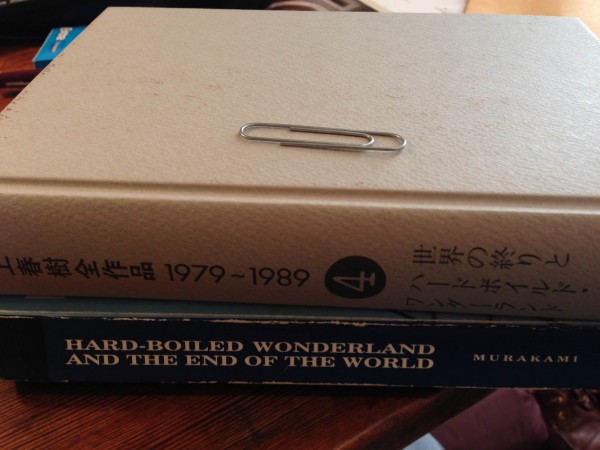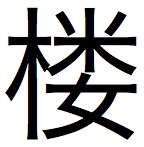
With the goal of stirring up even more interest in Murakami between now and mid-October, when the Nobel Prizes are announced, I will post a small piece of Murakami translation once a week from now until the announcement. You can see the other entries in this year’s series here: Jurassic Sapporo, Gerry Mulligan.
Murakami Fest continues, and we remain with Boku and the receptionist (whom we will later learn is named Yumiyoshi, a name that Boku doesn’t ask for until page 107, and even then she refuses to tell him – strange, but this is Murakami so we don’t ask too many questions). We remain in Chapter 7, a very long chapter indeed. So long that it required numerous cuts. We looked at a minor one last week. This week we look at three longer cuts.
After arriving at the bar, Boku sips on his J&B and water (coincidentally, the preferred drink of a certain investment banker from the 80s) until Yumiyoshi arrives. She’s tense from a long day at work but also from the mental preparation it’s taken to gear up to tell the story of her encounter with the Sheep Man on the sixteenth floor – the encounter was frightening. With that out of the way with, she and Boku continue on to more pleasant conversation about themselves. We learn that her family runs a ryokan in Asahikawa and that she worked in Tokyo at a hotel. Boku then remarks that that must be the reason why she looked like “the spirit of the hotel” when he first saw her. She shrugs it off and says she could never be that. Then we get these lines:
“I’m sure you can, if that’s what you want,” I smiled back.
She thought that over a while, then asked to hear my story. (49)
A quick cut away from her to Boku. In Japanese, however, the “thinking over” is much more drawn out:
「君なら、努力すればなれる」と僕は言って微笑んだ。「でも、ホテルには誰も留らないよ。それでいいの?みんなやってきてただ通り過ぎて行くだけだよ」
「そうね」と彼女は言った。「でも何かが留ると、怖いような気がするの。どうしてかしら?臆病なのかしら?みんながやってきて、そして去って行くの。でもそれでほっとするの。変よね、そんなのって。普通の女の子ってそんな風に思わないでしょう?普通の女の子って何か確かな物を求めている物なのよ。違う?でも私はそうじゃない。どうしてだろう?わからないわ」
「君は変じゃないと思う」と僕は言った。「まだ定まってないだけなんだ」
彼女は不思議そうに僕を見た。「ねえ、どうしてそんなことがあなたにわかるの?」
「どうしてだろう?」と僕は言った。「でも何となくわかるんだ」
彼女はしばらくそれについて考えていた。
「あなたの話をして」と彼女は言った。 (82)
My quick and dirty version:
“I’m sure you could, if you give it a shot,” I said with a smile. “But no one stays at a hotel forever. Would you be alright with that? Everyone arrives and then just passes straight through.”
“This is true,” she said. “But I feel like it’d be kind of scary if something actually stayed. I wonder why I feel that way? Maybe I’m just depressed chicken? Everyone arrives, and they leave. But it’s a relief. That’s strange, isn’t it? To think like that. Ordinary girls probably don’t think like that, right? Ordinary girls want something more definite, no? But I’m not like that. I dunno why.”
“I don’t think you’re strange,” I said. “It’s just that nothing’s been set for you yet.”
She looked at me strangely. “How do you know?”
“I dunno,” I said. “I can just tell.”
She thought about that for a second.
“Tell me about you,” she said.
First the language issues. You say 泊まる I say 留る; interesting decision to switch away from 泊まる which has been used earlier in the chapter. I translated as “stay forever,” although I’m sure there’s an option more nuanced than that. Not confident about my translation of 定まっていない, so I stayed pretty literal. Also not confident about the rendering of 臆病. Is she saying that she’s depressed? Or that “it’s a depressing thought,” it being the previous sentence?
Interesting section to cut. It doesn’t really add much, I don’t think, but it does play on typical Murakami themes, notably the “passing through” theme that Murakami mined in Wind-up Bird.
Boku goes on to give a rundown on his own life, emphasizing how pointless his current line of work is – he compares it to “shoveling snow”:
“Shoveling snow, huh?” she mused.
“Well, you know, cultural snow,” I said. (49)
And then there’s a space break. After the break, the translation picks up with, “We drank a lot.” In Japanese, however, there’s no space break. Just a continuation:
「雪かき」と彼女は言った。
「文化的雪かき」と僕は言った。
それから彼女は僕の離婚について知りたがった。
「僕が離婚しようと思って離婚したわけじゃない。彼女の方がある日突然出ていったんだ。男と一緒に」
「傷ついた?」
「そういう立場に立てば普通の人間なら誰でも多少傷つくんじゃないかな」
彼女はテーブルに頬杖をついて僕の目を見た。「ごめんなさい。変な訊きかたをして。でもあなたはどういうふうに傷つくのか、うまく想像できなかったの。あなたってどういう風に傷つくのかしら?傷つくとどうなるのかしら?」
「キース・ヘリングのバッジをコートにつけるようになる」
彼女は笑った。「それだけ?」
「僕が言いたいのは」と僕は言った。「そういうのって慢性化するってことなんだ。日常に飲み込まれて、どれが傷なのかわからなくなっちゃうんだ。でもそれはそこにある。傷というのはそういうものなんだ。これといって取り出して見せることのできるものじゃないし、見せることのできるものは、そんなの大した傷じゃない」
「あなたの言いたいことはすごくよくわかる」
「そう?」
「そうは見えないかもしれないけれど、私だっていろんなことで傷ついたのよ、ずいぶん」と彼女は小さな声で言った。「それでいろいろあって結局東京のホテルも辞めちゃったの。傷ついたの。辛かったし。私ってある種のことが上手く人並みに処理できないの」
「うん」と僕は言った。
「今でもまだ傷ついている。そのこと考えると今でも時々ふっと死んでしまいたくなる」
彼女はまた指輪を外して、またもとに戻した。それからブラディー・マリーを飲み、眼鏡をいじった。そしてにっこりと笑った。
僕らはけっこう酒を飲んでいた。 (83-84)
In translation:
“Shoveling snow,” she said.
“Shoveling cultural snow,” I said.
Then she wanted to know about my divorce.
“It wasn’t like I got divorced because I wanted to. One day she just up and left, with another guy.”
“Were you hurt?”
“Wouldn’t anyone feel pretty hurt in that position if they were a normal person?”
She put her chin on the table and looked me in the eyes. “I’m sorry. That was a strange way to ask. I just had trouble imagining how *you* hurt. What’s *your* pain like? What do you get like when you hurt?”
“I put a Keith Haring button on my coat.”
She laughed. “That’s it?”
“What I’m trying to say,” I said, “Is that it happens constantly. Everything gets caught up in the day to day and it’s impossible to tell what’s painful and what isn’t. But it’s in there. That’s what pain is. I can’t pull it out and say, ‘Voilà, here it is.’ Anything I could show you wouldn’t be all that painful.”
“I know exactly what you mean.”
“Yeah?”
“I might not look like it, but I’ve been hurt by a lot of things, really hurt,” she said in a soft voice. “A bunch of stuff happened and I ended up quitting the hotel in Tokyo. That hurt. It was tough. There are certain things that I’m just not able to process like other people.”
“Hmm,” I said.
“It still hurts. Even now when I think about those things sometimes I suddenly just want to die.”
She took off her ring again and again put it back on. Then she took a sip of her Bloody Mary and fidgeted her glasses. Finally she broke a smile.
We had a lot to drink.
Another interesting cut. I think this section goes mostly just because it can go. There’s nothing vital, but the discussion about pain/what it means to hurt is well penned, and it is interesting to see the beginning of the deeper connection between the two that Boku remarks upon in the next section as they drunkenly make their way into a taxi and on the way to her apartment. (“Maybe we really did have something in common, the two of us.” 50) And as they do, Boku gets the name of the magazine that ran an article about the suspicious history of the Dolphin Hotel (the alleged plot purpose for Yumiyoshi’s involvement).
Boku thinks about how he could probably sleep with Yumiyoshi, about what it means that he could probably sleep with her, she makes an excuse and says she lives with her sister, but then she reveals that to be false when he accompanies her to the door. Birnbaum creates a nice space break by turning Murakami’s dialogue into more witty repartee:
“It’s not true. Really, I live alone.”
“I know,” I said.
“A slow blush came over her. “How could you know?”
“Can’t say why, I just did,” I said.
“You’re impossible, you know that?”(51)
Space break, cut to the taxi driver waiting for Boku.
The Japanese reveals this to be the most questionable cut of the chapter:
「どうしてだろう?ただわかるんだよ」と僕は言った。
「あなたって嫌な人ね」と彼女は静かに言った。
「そうだな、そうかもしれない」と僕は言った。「でも最初に断ったように人の嫌がることはしないよ。何かにつけこんだりもしない。だから何も嘘なんかつくことはなかったんだ」
彼女はしばらく迷っていたが、やがてあきらめたように笑った。「そうね。嘘なんかつくことなかったのね」
「でも」と僕は言った。
「でも、とても自然についちゃったの。私も私なりに傷ついたのよ。さっきも言ったように。いろんなことがあって」
「僕だって傷ついている。キース・ヘリングのバッジだって胸につけてる」
彼女は笑った。「ねえ、少し中に入ってお茶でも飲んでいく?もう少しあなたと話がしたいわ」
僕は首を振った。「有り難う。僕も君と話がしたい。でも今日は帰るよ。どしてかはわからないけど、今日は帰った方がいいと思う。君と僕は一度にあまり沢山のことを話さない方がいいような気がする。どうしてだろう?」
彼女は看板の細かい字を読む時のような目つきでじっと僕を見ていた。
「うまく説明できない。でもそういう気がする」と僕は言った。「話すことが沢山ある時は少しずつ話すのがいちばんいいんだ。そう思う。あるいは間違っているかもしれないけれど」
彼女は僕の言ったことについて少し考えていた。それから考えるのをあきらめた。「おやすみなさい」と言って彼女は静かにドアを閉めた。
「ねえ」と僕は声をかけてみた。ドアが十五センチほど開いて、彼女が顔を見せた。「また近いうちに君を誘ってみていいかな」と僕は聞いてみた。
彼女はドアに手をかけたまま深くいきを吸いこんだ。「たぶん」と彼女は言った。そしてまたドアが閉まった。 (87-88)
In translation:
“I dunno why. I just do,” I said.
“You are a bastard,” she said quietly.
“Yeah, maybe so,” I said. “But I don’t hate women who say no, and I never take advantage of anyone. So there was nothing for you to lie about.”
She was confused for a moment but eventually smiled, like she’d given up. “Yeah. I didn’t have to lie.”
“*But*,” I said.
“But it just came out. I hurt like I hurt, as I mentioned earlier. Things happened.”
“I hurt too. I’ve got a Keith Haring button on my chest.”
She laughed. “Why don’t you come in for a cup of tea? I want to talk more.”
I shook my head. “Thanks. I’d like to talk as well, but tonight I’ll go back. I dunno why, but I think it’s best for me to go back tonight. I just feel like it’s best that you and I don’t say too much all at once. Wonder why that is?”
She stared at me with her eyes squinted like she was trying to read the find print on a sign.
“I can’t explain it. That’s just how I feel,” I said. “It’s always best to say things a little at a time when you’ve got a lot of things to talk about. That’s what I think. But I might be wrong.”
She thought about what I said for a second. Then she gave up thinking. “Good night,” she said and quietly closed the door.
“Hey,” I called out. The door opened a few inches, and she stuck her face out. “Is it alright if I ask you out again sometime soon?” I asked.
She took in a deep breath with her hand still on the door. “Maybe,” she said. Then the door shut again.
Whew. What a cut. This one makes more sense. Birnbaum’s decision to cut this section keeps Boku a more suspicious character, and cutting it doesn’t force him to alter the narrative elsewhere in the chapter. The original Japanese breaks the tension by letting us see exactly how nice a guy this Boku character actually is. Yet he refuses the offer and doesn’t press his luck, a true gentleman, now in search of the true answer to his existential dissatisfaction. This does make sense in the order of the Murakami canon; Boku is all growns up.








